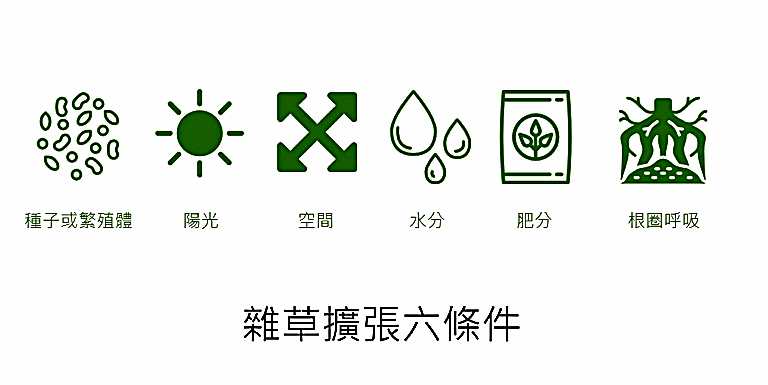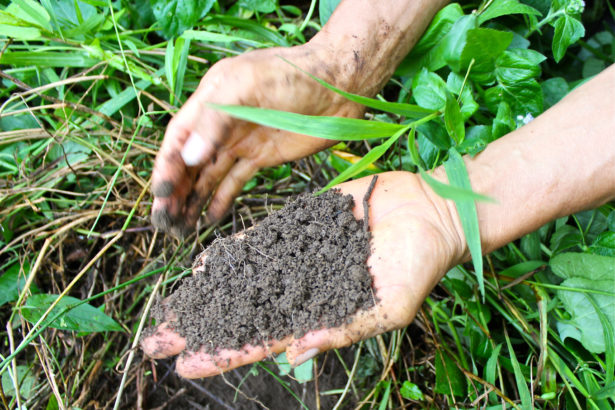Chen Xingzong / Paraquat dispute, six methods of soil and fertilizer to help you control weeds
0 sharing
I want to remind you of some things that I can do my best, but go unnoticed.
I would like to write an article for farmers to share with you a feasible way to reduce the use of herbicides and get a lot of bear paws and fish at the same time.
Every plant that grows in a position that is not expected by farmers can be defined as a weed. The control of weeds has always been one of the important tasks of most farmers. Whether it's the issue of weeds on ecosystem and soil health, or the harm of herbicide abuse on soil and crops, I don't need to repeat it here. You can get a lot of information from the Internet.
Modern farmers should be aware of the positive functions of weeds and the negative effects of using herbicides, but the annual consumption of herbicides in Taiwan is still so astonishing. What does this mean?. Is there a last resort? Or have you formed a habit? This also makes me have a sense of mission to write this article.
News background: in 2017, the total use of pesticides in China reached 15,549 metric tons, a 17-year high, and the use of herbicides reached 4392 metric tons (in terms of effective components) also broke the all-time high.
! function {var n = "InfogramEmbeds", o=e.getElementsByTagName ("script"), script [0], else if / ^ e.location (e.location)? "http:": "https:"; if (/ ^\ / {2} / .test (I) & (i=r+i), i=r+i [n] & & process&& [.initialized) windown [.process]; else if (! e.getElementById (s)) {var a=e.createElement ("script") A. Asyncwriting 1 document,0 a. Idyllic. A. Srcedi. ParentNode.insertBefore (a, d)}} (document,0, "infogram-async", "/ / e.infogram.com/js/dist/embed-loader-min.js")
In the countryside, I see views that support the existence of herbicides:
Some people complain that Taiwan is warm and rainy, that weeds tend to flourish more than expected, and that farmers are getting older and weaker. Herbicides can be of great help.
Some farmers complain that the cost of farming is high, the price of products is not beautiful, and herbicides can reduce the cost of production management.
Some people think that herbicides can control weeds, prevent weeds from becoming habitats for insect diseases, and avoid weeds competing with crops for space, water and fertilizer.
With regard to paraquat, some farmers have a special view:
Prepared farmers think that the scientific literature shows that paraquat is easy to be absorbed by the soil, easy to be decomposed, poor mobility, and has little impact on ecology. They believe paraquat is a relatively friendly herbicide. ("easy to be fixed in the soil, not easy to move" does not mean good or bad, but a trait, which means that the damage will be limited to a relatively small area.)
Referring to the plant protection manual, the scope of registration of paraquat is limited to citrus orchards, tea gardens, rice fields before ploughing, sugarcane orchards, non-cultivated farmland and pea fields. However, on the news and in rural areas, I have observed that many farmers who oppose the ban do not necessarily grow the above-mentioned specific crops. For no other reason, paraquat is easy to be fixed by soil, not easy to detect, and its relatively low price is a reasonable reason for its popularity in rural areas.
The price of paraquat is cheap and the effect is remarkable, and the other two giants' Jiaposai can not be compared with herbicide.
The thorniest problem of paraquat is that it will be used as a suicide tool. It is expected that the government will have supporting management measures so that farmers can continue to use it.
There are several important key considerations in the aforementioned farmers' point of view, which are nothing more than high operating costs, aging, and difficult to control diseases, pests and weeds. I believe that in addition, there should be a decline in product yield, unstable sales channels, and a decline in output. Wait for the question.
When Paraquat meets politics
Since the Prevention and Inspection Bureau announced on May 24, 106 that Paraquat was about to be banned, various positive and negative refutation messages about the existence of Paraget have continued to fill the media, and more recently, they have also been involved in politics, confusing the views. When the profession involves politics and public opinion, I think this problem is very difficult to solve. Their arguments and views have their own religious backgrounds, and it should be very difficult to reach a consensus in a short period of time.
Although it will be officially banned from February 109, if no consensus is reached, disputes will persist in the future and may even become a bargaining chip for political pull-out.
The all-round killing method of weeding brings tenacious grass species in an all-round way.
Compared with the crops that we take good care of, weeds that can get used to regional soil conditions have more advantages in the whole field, even if they are exotic species; in addition, the quality of weeds is small and requires less resources, so they can establish populations with limited water and fertilizer resources in a short period of time and continue to expand. The sight of lush weeds also means that the land still has the possibility of allowing plants to grow, but weeds are always more luxuriant than crops. Pigs are not fat, but fat on dogs, should be the best metaphor.
In the grass cultivation movement that has been paid more and more attention, the symbiosis of orchards and weeds should be the easiest goal to achieve. I'll take the common and annoying herb in the orchard as an example.
Euphorbia vulgaris is a common C4 weed (not afraid of the sun and growing fast, small Ben Dolly, resistant to cutting and exercise). When the grass phase presents a monotonous herbaceous grass, it means that there used to be "all-round killing" management as an intervention for a period of time. As long as the herbicide effect is over, the weeds in the region germinate at the same time, and the herbicide with special adaptability to the environment usually gives priority to the expansion advantage. After several consecutive "all-round killing" weed treatment, Euphorbia angustifolia gradually increased the occupied area again and again, and soon occupied the advantage of the whole region.
How to implement the plan to control weeds? You can follow the procedure to control weeds:
After long observation, I found that weeds need six factors such as seed or vegetative form, sunlight, space, moisture, fertilizer and rhizosphere respiration to survive and expand. If we choose one, two and three of the above six factors... Deprivation, can weeds still grow well? My experience is to make good use of the above six factors to achieve reasonable control of weeds.


We can imagine that when the newly planted tomato seedlings are busy opening roots and growing leaves and sprouting, we can imagine from the increased "overall crop weight" that much less mineral nutrients will be needed during this period of time than during continuous harvesting. Therefore, the amount of fertilizer used just before flowering must be less than that of continuous harvest.
Therefore, in addition to the early excessive fertilization can not make effective use of crops, but also lead to a waste of money, and even cause root damage, luxuriant weeds, uncontrollable diseases and insect pests, damage to soil health. Wait. It's actually asking for trouble. (the article is not finished, please continue to read)
Chen Xingzong / weed is not the enemy, but the god teammate of the soil, and can also help farmers increase their income.
Regain the strength of grass! Series of reports on soil damage caused by herbicide abuse]
Spread the original wildflower grass blanket in the orchard ~ the result surprised the farmers.
What happens if the orchard hasn't weeded for 12 years? Fertile soil and thriving fruit trees
The highly toxic pesticide paraquat remains banned, and the Council of Agriculture: the substitute spraying system cannot be pushed, and farmers: it is better not to spray farmers for marketing.
Controversy over banning paraquat: rural suicidal labor loss vs higher agricultural production costs, which is less or less serious?
- Prev

[17 countries New resident Market Kaohsiung International Recreation]
[17 countries New resident Market Kaohsiung International Recreation]
- Next

Chen Xingzong / weed is not the enemy, but the god teammate of the soil, and can also help farmers increase their income.
Chen Xingzong / weed is not the enemy, but the god teammate of the soil, and can also help farmers increase their income.
Related
- A course of planting techniques and methods on how to grow carrots
- How to plant the latest tulips?
- Is it better to pick tea in the morning or in the afternoon? When is the best time for tea to be picked? what is the third or fifth tea?
- Launch Yuanxiao Happy combination Haocha + Tea Yuan healthy Taste
- Penghu Tourism "Fireworks 20 Parade with You"
- 2022 West Lake Happiness holds "Digital Revitalization Voucher" and draws iphone13 and laptop.
- Banqiao Fuzhou social houses are designed to change start-up combined with police elimination to create a safe and livable environment
- The convenient measure of "mechanical weeding" in Xinbei has been abused and the Agriculture Bureau has imposed heavy penalties on the illegal land consolidation.
- Changgeng University Joins Hands with Four Memory Factories to Rescue Memory Talent Shortage
- The list of Taiwan's top 100 MVP managers is listed by the Director-General of the Farmers' Association of Sanxia District.

